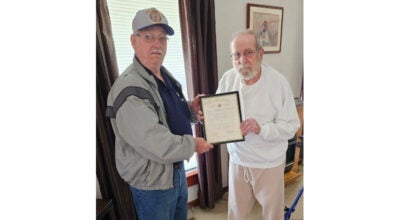Bill would exempt trade secrets from FOIA
Published 10:47 am Friday, January 26, 2018
by Adam Hamza
Capital News Service
RICHMOND
Open government and environmental advocates are once again battling bills they say that would limit public-information access by creating a Freedom of Information Act exclusion for trade secrets.
HB 904 by Del. Roxann Robinson, R-Chesterfield, would create general exclusions from FOIA for trade secrets submitted to a public body. It passed its initial hearing in a House General Laws subcommittee Tuesday. The bill is similar to four others Robinson introduced last year that would have allowed FOIA exemptions for chemical names and concentrations used in hydraulic fracturing, known as fracking. All failed to pass.
The new bill is supported by the Freedom of Information Advisory Council. Alan Gernhardt, the council’s executive director, said the bill simplifies the way FOIA treats trade secrets.
He said that over the past few years, FOIA exemptions have been issued based specifically on the type of record as well as the agency. This means each time an exception is sought, an individual exemption must be crafted.
“The problem is more and more agencies are holding or receiving trade secrets, and so they’re asking for more exemptions every year,” Gernhardt said. “We want to get the one general exemption everybody can use and remove the language that’s specific for each agency.”
Opponents of the bill countered that the exclusions are too broad and carry significant unintended consequences — mainly, keeping more information from citizens.
Emily Francis, representing the Southern Environmental Law Center, criticized what she termed a sweeping exemption. She said the legislation doesn’t address the center’s concerns from Robinson’s earlier bills, including the need to provide public access to the names of chemicals used in fracking.
“The public would like access to this information. As of today, they do have access to this information, and they would like (continued) access to that information,” she said.
Megan Rhyne, executive director of the Virginia Coalition for Open Government, expressed objections similar to those of the law center.
“We do want to point out that, yes it has been worked on for four years, and the bill that came – nobody was happy with it,” Rhyne said.
Corrina Beall, political director of the Virginia chapter of the Sierra Club, and Daria Christian, assistant director of the Friends of the Rappahannock, also spoke in opposition.
Trade secrets in the legislation are based on the definition in Virginia’s Uniform Trade Secrets Act, according to the bill summary.
A trade secret, according to the act, “means information, including but not limited to, a formula, pattern, compilation, program, device, method, technique, or process, that: 1. Derives independent economic value, actual or potential, from not being generally known to, and not being readily ascertainable by proper means by, other persons who can obtain economic value from its disclosure or use, and 2. Is the subject of efforts that are reasonable under the circumstances to maintain its secrecy.”





